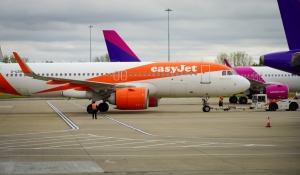London Luton Airport Leads European Airports in Adoption of Next-Generation Aircraft

More flights at London Luton Airport (LLA) were operated using quieter, more fuel efficient “next generation” aircraft this summer than at any other major European airport.
Data gathered from aviation intelligence and data specialist RDC Aviation, shows that between April and August 2023, more than a third (33.5%) of all flights from LLA were operated using Airbus neo or Boeing Max variants, reducing emissions by up to 20%.
This year has seen LLA working with its three largest airlines to double their next generation fleet averages operating at the airport. In April, Ryanair announced the addition of three new 737 8200 (MAX) aircraft to be based at LLA, while Wizz Air is increasing the number of Airbus A321 neos in its LLA fleet to 100% by 2025. easyJet has also increased the number of Airbus neo operating flights from LLA.
Alberto Martin, Chief Executive Officer at London Luton Airport, commented: “The analysis from leading aviation data provider RDC, highlights the significant strides that London Luton Airport is making as we look to work more sustainably with airlines. As well as our own commitment to achieve Net Zero carbon for our own airport emissions by 2040, we are working closely with our airlines to reduce their emissions and the agreements secured this year with easyJet, Ryanair and Wizz represent important milestones in our sustainable aviation strategy.”
Yvonne Moynihan, Corporate and ESG Officer at Wizz Air, added: “We are already leading in sustainability, operating the youngest fleet in Europe¹ in the most efficient way. London is an important market for Wizz Air and we are confident that fleet renewal is a key solution available here and now to reduce emissions from aviation. Currently, the newest and more fuel-efficient Airbus A321neo accounts for over 60% of our total fleet at London Luton Airport. Replacing older generation aircraft with newer technology is part of our long-term fleet renewal strategy to reduce carbon intensity by 25% by 2030. As LLA’s largest operator we are delighted to work on finding new and innovative solutions that help us to reach our targets together, collectively as an industry.”
ADVERTISEMENT
The data shows that the increase in next generation aircraft accounted for 33.52% of total departures from LLA, ahead of second place Budapest Ferenc Liszt Airport and third placed Lisbon Airport, with Milan Orio Al Serio and Athens Eleftherios Venizelos making up the top five².
For further information on London Luton Airport’s plan to achieve net zero in its emissions³ by 2040, please click here: https://www.london-luton.co.uk/corporate/community/net-zero
¹ Based on official publicly disclosed information
² Excluding Turkey
³ Net Zero in our Scope 1 and 2 emissions that we have direct control over

